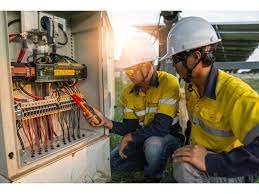
In the realm of modern civilization, electricity is the lifeblood that powers our daily lives. From the flicker of a light switch to the hum of machinery in factories, the smooth operation of our electrical systems is paramount. Behind the scenes, a cadre of skilled professionals ensures that this essential resource flows seamlessly to homes, businesses, and industries. Among them, the assistant electrician stands as a vital cog in the machinery of electrical infrastructure. In this article, we’ll delve into the responsibilities, qualifications, challenges, and importance of the assistant electrician role.
Understanding the Role:
An assistant electrician serves as a crucial support to licensed electricians in various settings, including construction sites, residential buildings, commercial establishments, and industrial facilities. Their responsibilities span a wide spectrum, ranging from assisting in the installation, maintenance, and repair of electrical systems to troubleshooting faults and ensuring compliance with safety standards.
At the heart of their duties lies a blend of technical prowess and practical know-how. They may find themselves pulling cables, mounting fixtures, testing circuits, or interpreting blueprints under the supervision of a journeyman or master electrician. Their role demands precision, attention to detail, and a commitment to safety protocols to mitigate risks and prevent accidents.
Qualifications and Training:
While the specific requirements may vary by jurisdiction and employer, aspiring assistant electricians typically undergo formal training through vocational programs, apprenticeships, or technical schools. These programs equip them with fundamental knowledge of electrical principles, wiring techniques, tools, and safety procedures.
Apprenticeships are particularly valuable, offering a hands-on learning experience alongside seasoned professionals. During this period, apprentices gain practical skills, earn certifications, and accrue the requisite hours of supervised work to qualify for licensure or certification exams.
Additionally, assistant electricians must possess physical dexterity, problem-solving abilities, and a willingness to continually update their skills to adapt to evolving technologies and regulations in the electrical industry.
Challenges and Rewards:
The role of an assistant electrician is not without its challenges. Working with electricity inherently carries risks, ranging from electric shocks to fire hazards, making safety a top priority at all times. Moreover, the nature of the job often entails working in diverse environments, from cramped crawl spaces to towering heights, exposing assistants to varying weather conditions and physical demands.
However, amidst these challenges lie numerous rewards. Assistant electricians play a pivotal role in powering communities, contributing to the construction of homes, infrastructure, and commercial spaces that form the backbone of society. They derive satisfaction from seeing their handiwork come to life, knowing that their efforts have a tangible impact on people’s lives.
Furthermore, the electrical industry offers ample opportunities for career advancement and specialization. With experience and further education, assistant electricians can progress to become licensed electricians, electrical contractors, or even electrical engineers, opening doors to higher earning potential and leadership roles.
Importance in Society:
The importance of assistant electricians in society cannot be overstated. They are the unsung heroes who ensure the uninterrupted flow of electricity, a resource that underpins virtually every aspect of modern living. Whether it’s lighting up homes, powering essential medical equipment, or driving technological innovations, electricity is the lifeblood of progress.

In times of crisis, such as natural disasters or infrastructure failures, the role of assistant electricians becomes even more critical. They work tirelessly to restore power, providing relief to affected communities and enabling essential services to resume normal operations swiftly.
Moreover, assistant electricians contribute to sustainability efforts by promoting energy efficiency and renewable energy integration. Through their expertise in installing and maintaining solar panels, wind turbines, and other eco-friendly technologies, they help mitigate environmental impact and pave the way for a more sustainable future.
Conclusion:
In conclusion, the role of an assistant electrician is indispensable in our electrified world. Through their technical prowess, dedication to safety, and commitment to excellence, they ensure that the wheels of progress keep turning. From the construction site to the factory floor, from the skyscraper to the suburban home, assistant electricians are the silent guardians of our electrical infrastructure, powering up the world one connection at a time.
